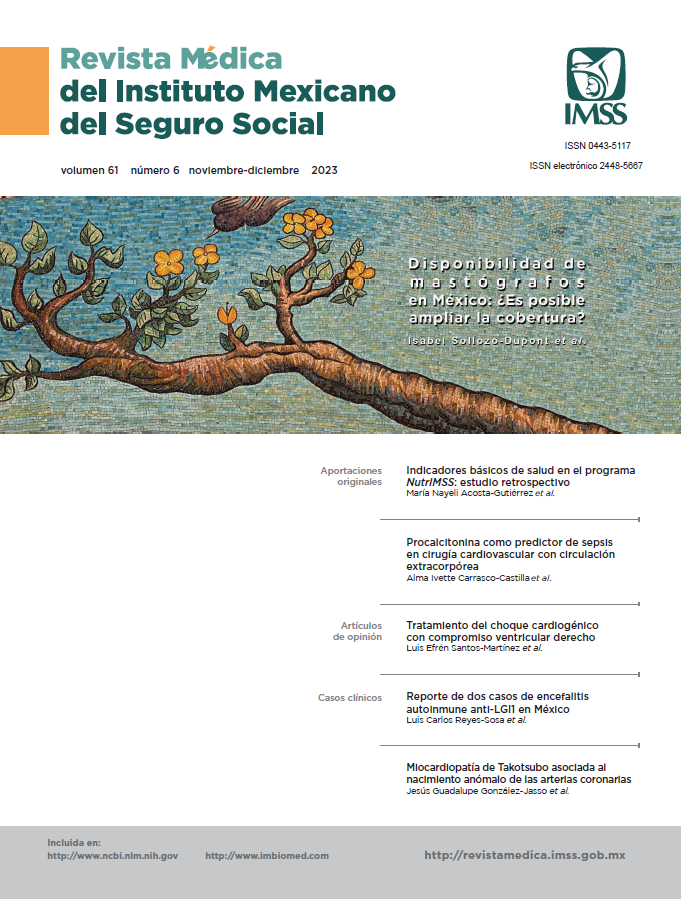Basic health indicators in the NutrIMSS program: a retrospective study
Main Article Content
Keywords
Abstract
Background: The NutrIMSS program is granted to populations with chronic conditions to improve basic health indicators and its effectiveness in this population is unknown.
Objective: To analyze the change in the basic health indicators of patients who attended the NutrIMSS Program, at the UMF No. 2 of the IMSS in Mexico City, during the period 2018 to 2019.
Material and methods: From 105 files of IMSS beneficiaries, a retrospective cohort study was carried out considering two measurements, before and after the NutrIMSS program. To evaluate the average change over time of health indicators, GEE models (Generalized Estimation Equations) and multiple linear regression models were used. Statistical analysis was used using the statistical program StataCorp 2015.
Results: Patients who attended the Program showed changes between the beginning and end of the period with an average of three months of follow-up. They presented a decrease in the following health indicators: body weight of 1 kg, body mass index: 0.8 kg/m2, glucose of 13 mg/dL, triglycerides of 57 mg/dL and cholesterol of 17 mg/dL (p < 0.005 in all cases). There was no difference in the level of blood pressure.
Conclusions: The NutrIMSS program influenced the improvement of the health indicators of the population of the program and is an ally to improve the health of the IMSS beneficiary population.
References
Lin X, Li H. Obesity: Epidemiology, pathophysiology, and therapeutics. Front Endocrinol (Lausanne). 2021;12:706978. doi: 10.3389/fendo.2021.706978.
Westbury S, Oyebode O, Van-Rens T, et al. Obesity stigma: Causes, consequences, and potential solutions. Curr Obes Rep. 2023;12(1):10–23. doi: 10.1007/s13679-023-00495-3.
Gjermeni E, Kirstein AS, Kolbig F, et al. Obesity-an update on the basic pathophysiology and review of recent therapeutic advances. Biomolecules. 2021;11(10):1426. doi: 10.3390/biom11101426.
Bray GA, Heisel WE, Afshin A, et al. The science of obesity management: An endocrine society scientific statement. Endocr Rev. 2018;39(2):79–132. doi: 10.1210/er.2017-00253.
World Obesity Federation. Coronavirus (COVID-19) & obesity [Internet]. Reino Unido: World Obesity Federation; 2021 [citado 2023 julio 2023]. Disponible en: https://www.worldobesity.org/news/statement-coronavirus-covid-19-obesity.
Simonnet A, Chetboun M, Poissy J, et al. High prevalence of obesity in severe acute respiratory syndrome Coronavirus-2 (SARS-CoV-2) requiring invasive mechanical ventilation. Obesity (Silver Spring). 2020;28(10):1194–9. doi: 10.1002/oby.22831.
Petrilli CM, Jones SA, Yang J, et al. Factors associated with hospital admission and critical illness among 5279 people with coronavirus disease 2019 in New York City: prospective cohort study. BMJ. 2020;369:m1966. doi: 10.1136/bmj.m1966.
Caussy C, Wallet F, Laville M, et al. Obesity is Associated with Severe Forms of COVID-19. Obesity (Silver Spring). 2020;28(7):1175. doi: 10.1002/oby.22842.
Muscogiuri G, Pugliese G, Barrea L, et al. Commentary: Obesity: The “Achilles heel” for COVID-19? Metabolism. 2020;108:154251. doi: 10.1016/j.metabol.2020.154251.
Lobstein T, Brinsden H, Neveux M, et al. World Obesity Atlas 2022. Londres: World Obesity Federation; 2022. 284 p.
Organización Mundial de la Salud. Obesidad y sobrepeso [Internet]. Organización Mundial de la Salud; 2021 [citado 2023 julio 11]. Disponible en: https://www.who.int/es/news-room/fact-sheets/detail/obesity-and-overweight .
Rodríguez-García JC, Aguirre-Mendoza BN, Acosta-Gutiérrez MN, et al. Aprendiendo a Comer Bien. Guía técnica de educación nutricional en primer nivel de atención. 3a ed. México: Instituto Mexicano del Seguro Social; 2020. 165 p.
Delahanty LM, Sonnenberg LM, Hayden D, et al. Clinical and cost outcomes of medical nutrition therapy for hypercholesterolemia: a controlled trial. J Am Diet Assoc. 2001;101(9):1012–23. doi: 10.1016/S0002-8223(01)00250-4.
Zeman H, Cavanaugh E, Metallinos-Katsaras E, et al. Improved long-term outcomes in high-risk patients receiving registered dietitian nutritionist care. Endocr Metab Sci. 2021; 2:100078. doi: 10.1016/j.endmts.2021.100078.
Gaetke LM, Stuart MA, Truszczynska H. A single nutrition counseling session with a registered dietitian improves short-term clinical outcomes for rural Kentucky patients with chronic diseases. J Am Diet Assoc. 2006;106(1):109–12. doi:10.1016/j.jada.2005.09.051.
Rosado-Batista MC, Castro-Franceschini SC. Impact of nutritional counseling in reducing serum cholesterol in public health service patients. Arq Bras Cardiol. 2003;80(2):167–70. doi: 10.1590/s0066-782x2003000200005.
Zujko ME, Rożniata M, Zujko K. Individual diet modification reduces the metabolic syndrome in patients before pharmacological treatment. Nutrients. 2021;13(6):2102. doi: 10.3390/nu13062102.
Patnode CD, Evans CV, Senger CA, et al. Behavioral counseling to promote a healthful diet and physical activity for cardiovascular disease prevention in adults without known cardiovascular disease risk factors: Updated evidence report and systematic review for the U.S. preventive services task force. JAMA. 2017;318(2):175-93. doi: 10.1001/jama.2017.3303.
Guilbert E, Perry R, Whitmarsh A, et al. Short-term effectiveness of nutrition therapy to treat type 2 diabetes in low-income and middle-income countries: systematic review and metaanalysis of randomised controlled trials. BMJ Open. 2022;12(3):e056108. doi: 10.1136/bmjopen-2021-056108.
Sikand G, Cole RE, Handu D, et al. Clinical and cost benefits of medical nutrition therapy by registered dietitian nutritionists for management of dyslipidemia: A systematic review and meta-analysis. J Clin Lipidol. 2018;12(5):1113–22. doi: 10.1016/j.jacl.2018.06.016.
Low JHM, Toh DWK, Ng MTT, et al. A systematic review and meta-analysis of the impact of different intensity of dietary counselling on cardiometabolic health in middle-aged and older adults. Nutrients. 2021;13(9):2936. doi: 10.3390/nu13092936.
Dobrow L, Estrada I, Burkholder-Cooley N, et al. Potential effectiveness of registered dietitian nutritionists in healthy behavior interventions for managing type 2 diabetes in older adults: A systematic review. Front Nutr. 2022;8:737410. doi:10.3389/fnut.2021.737410
Agee MD, Gates Z, Irwin PM. Effect of medical nutrition therapy for patients with type 2 diabetes in a low-/no-cost clinic:A propensity score-matched cohort study. Diabetes Spectr. 2018;31(1):83–9. doi: 10.2337/ds16-0077.
Rees K, Dyakova M, Ward K, et al. Dietary advice for reducing cardiovascular risk. Cochrane Database Syst Rev. 2013; 2013(12):CD002128. doi: 10.1002/14651858.CD002128.pub5.
Filippou CD, Tsioufis CP, Thomopoulos CG, et al. Dietary approaches to stop hypertension (DASH) diet and blood pressure reduction in adults with and without hypertension: A systematic review and meta-analysis of randomized controlled trials. Adv Nutr. 2020;11(5):1150–60. doi: 10.1093/advances/nmaa041.


